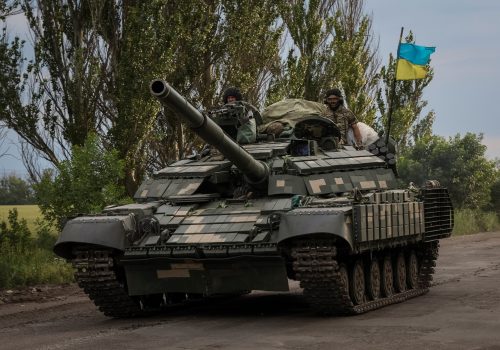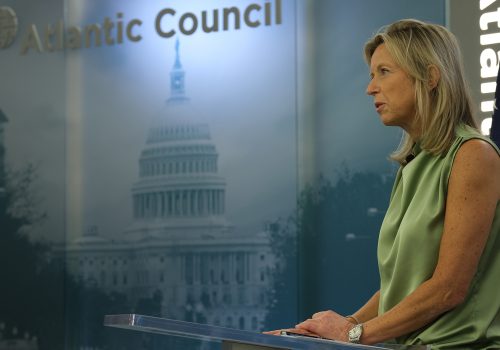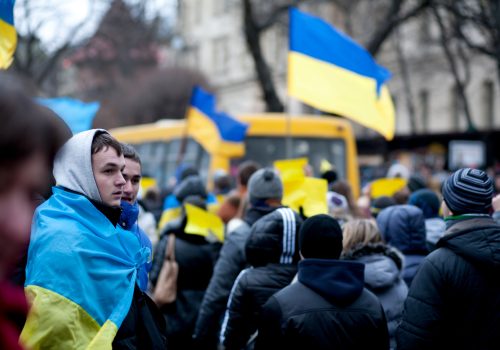Ukraine can feed the world again. But at what cost?
JUST IN
The world’s breadbasket is back. Russia and Ukraine signed separate deals with the United Nations and Turkey in Istanbul today that will unblock commercial exports from three southern Ukrainian ports including Odesa—where more than twenty million tons of grain have been held up amid Russia’s invasion of its neighbor. It’s a promising development far beyond just the Black Sea, allowing countries dependent on Ukrainian grain to breathe a sigh of relief following fears of a mounting global food crisis. But how fragile is this wartime deal? And what did Ukraine really gain? Our experts shipped off their takes.
TODAY’S EXPERT REACTION COURTESY OF
- John Herbst (@JohnEdHerbst): Senior director of the Atlantic Council’s Eurasia Center and a former US ambassador to Ukraine
- Yevgeniya Gaber (@GaberYevgeniya): Nonresident senior fellow with Atlantic Council IN TURKEY and former foreign-policy adviser to the Ukrainian prime minister
Immediate relief
- John calls the agreement a “stunning development” that could amount to “a major boon for Ukraine’s economy”—which is expected to plummet by 45 percent this year—and stave off major food shortages in Africa, the Arab world, and South Asia.
- But Yevgeniya is “very cautious” about labeling this “a major breakthrough and a win-win situation.” That’s because it raises a slew of questions for Kyiv.
- First off, Yevgeniya tells us, it’s worth asking: “Will this deal be viable, and for how long will it be implemented?” After all, Russia has a history of breaking these kinds of accords. “If there is a provocation or a major security crisis during the shipment of goods navigated by Ukrainian ships, who will be held responsible?”
Who wins?
- Yevgeniya says Russia bagged three kinds of victories in Istanbul: “face-saving, time-saving, and cost-saving.” It can now sell its fertilizer and agricultural products unimpeded, while its military can take a “tactical pause to regroup forces in the south of Ukraine, where it is now suffering major losses.”
- Most of all, Yevgeniya says, Moscow can shift the geopolitical narrative about its aggressive bullying “by positioning itself as a constructive actor willing to make deals.”
- But John tells us that both nations had their security concerns met, since Ukraine won’t need to demine its waters and Russia will see its request granted for weapons checks on commercial ships. If Moscow implements the deal, “ships can sail as soon as the middle of next week,” he notes.
- The clear winner? Turkey—after President Recep Tayyip Erdogan played shuttle diplomat between the Russian and Ukrainian presidents and set up a ship monitoring center in Istanbul staffed by both countries. “Turkey has significantly expanded its diplomatic footprint and political clout regionally and globally,” Yevgeniya says.
Daring diplomats
- More broadly, John believes, this deal is a major bright spot in a brutal war. “It would be the first time diplomacy has achieved a tangible result since Moscow’s February offensive began.”
- That may be so, but Yevgeniya points out that Ukraine’s minister of infrastructure signed the deal—not a higher-level official—and that each country signed agreements with the United Nations, not each other.
- Those two factors show Ukraine’s “lack of trust with Russia and the desire to lower the status of the deal to a technical level, dealing with specific logistical details to unblock food supplies to struggling people in Africa,” Yevgeniya says.
- Bottom line? Don’t expect the shooting to stop. This arrangement, Yevgeniya adds, avoids “any chance for broader political and military arrangements with an aggressor country.”
Further reading
Wed, Jul 20, 2022
Ukraine can win
UkraineAlert By Richard D. Hooker, Jr.
If the West takes active measures to ensure Ukraine can't defeat Putin's Russia, it won't. But if it commits to supplying the range of capabilities required for modern, high intensity warfare, Ukraine can win, and it will win.
Fri, Jul 15, 2022
Europe ‘must get its act together’ on defense, says Dutch defense minister
New Atlanticist By Katherine Golden
Ollongren spoke about supporting Ukraine and shoring up European defense with allies at an Atlantic Council Front Page event.
Wed, Jul 13, 2022
Ukraine needs more international support
Econographics By
As the war in Ukraine becomes severely protracted, the international community by advancing Ukraine’s proposed roadmap to end the war and clarifying its economic policies in response to Russian aggression.
Image: Ears of wheat are seen in a field of farmer Mykola Tereshchenko, as Russia's attack on Ukraine continues, in the village of Khreshchate, in Chernihiv region, Ukraine on July 5, 2022. Photo via REUTERS/Valentyn Ogirenko.



